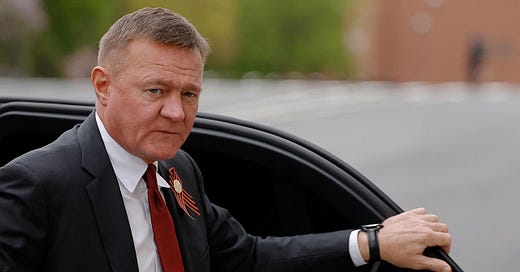Shocking death of minister reminds Russians of Soviet-era purges
The death of former Russian transport minister Roman Starovoit – whose body was found hours after his dismissal on Monday – has sent shockwaves in the country amid the ongoing war with Ukraine.
By Sergei Goryashko.
The death of former Russian transport minister Roman Starovoit – whose body was found hours after his dismissal on Monday – has sent shockwaves through the country amid the ongoing war with Ukraine.
The 53-year-old died of a suspected self-inflicted gunshot wound in his car, but the timing of his death is unclear. Quoting an unnamed source close to the investigation, the Russian business publication Forbes reported that Starovoit died more than a day ago.
If confirmed, Starovoit would be the first minister to die by suicide in more than 30 years. In 1991, interior minister Boris Pugo took his life after participating in a failed coup against President Mikhail Gorbachev.
However, Starovoit's story appears to more closely resemble the fate of another Soviet interior minister Nikolai Shchelokov, who faced charges for corruption, theft and abuse of power after he was dismissed from office. Shchelokov shot himself in 1984, one day after he was stripped of all state honours.
In April, Starovoit's former deputy, Alexey Smirnov, was appointed as his successor in Kursk - only to be arrested weeks later for allegedly embezzling one billion roubles ($12.8m) in defence funds.
Starovoit may well have been living in fear during the last three months of his life, even though the dreaded phrase “loss of trust” - often used in dismissals of corrupt officials who may then suffer serious consequences - was not used in the Kremlin decree that led to him leaving office.
Cases where detainees testify against their superiors are pretty common in Russia's justice system. But until now, officials either waited for arrest, clinging to the hope that their high-level connections would save them, or they managed to escape abroad.
A criminal case against Starovoit was about to start, according to the Russian newspaper Kommersantand the business news agency RBC. His former deputy Smirnov also allegedly testified against him, according to Kommersant.
In the past decade, dozens of officials have been charged and detained with fraud and embezzlement charges. But since last year, cases related to defence spending have increased.
In early July, Russia's former deputy defence minister, Timur Ivanov, was sentenced to 13 years in prison for embezzlement and money laundering in a high-profile case.

Starovoit's death vividly illustrates the growing panic among senior officials under threat of arrest, as they are keenly aware of the minuscule rate of acquittals and the dire conditions in penal colonies.
The mysterious circumstances also hark back to the Stalin era, when it was common for officials to take their own lives, fearing arrest and subsequent execution.
Ukraine occupying part of the Kursk region was a blow to Vladimir Putin’s prestige. Someone had to be held accountable, the only question was whether generals or civilian officials would take the fall.
It seems the system opted to punish the latter, and Roman Starovoit found himself in a position to be the main culprit held responsible for the occupation of his home region.
Read this story in Russian here.






Will this lessen institutional corruption in Russia? Unlikely.